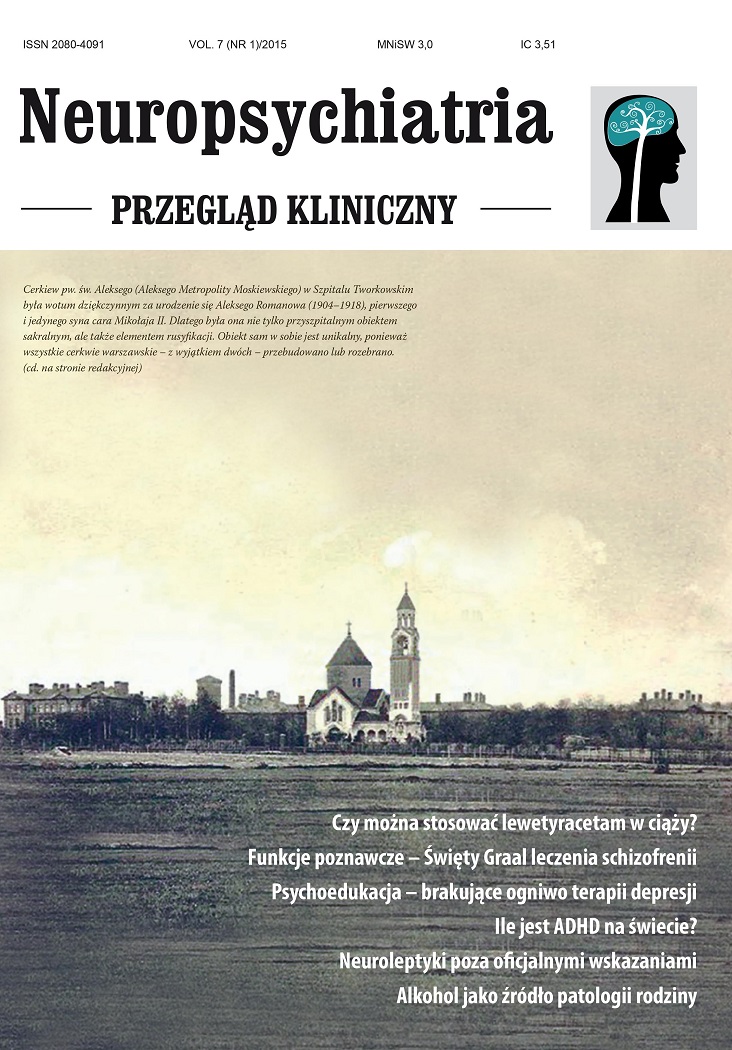Psychoedukacja – brakujący element w terapii depresji Artykuł przeglądowy
##plugins.themes.bootstrap3.article.main##
Abstrakt
Depresja jest chorobą wielowymiarową i niejednorodną w swoim przebiegu. Mimo coraz lepszej znajomości patomechanizmów oraz rosnącej wiedzy na temat etiologii zaburzeń afektywnych wciąż przegrywamy w tej nierównej walce. Pierwszym utrudnieniem są choroby somatyczne, a następnie osobowość pacjenta, towarzyszące zaburzenia lękowe czy choroby neurologiczne. Dodatkowym problemem jest fakt, że w ciągu ostatniego dziesięciolecia nie mieliśmy żadnych istotnych odkryć w zakresie farmakoterapii depresji. A wymagania pacjentów stają się coraz wyraźniejsze i głośniejsze. Leczenie farmakologiczne powinno być bezpieczne, dobrze tolerowane i dodatkowo skuteczne, co uzyskuje się tak naprawdę tylko w niewielu przypadkach leków przeciwdepresyjnych (przykładem jest escitalopram). Dlatego tak istotne wydają się wszelkie dodatkowe działania, które mogą usprawnić i przyspieszyć proces leczenia depresji. Najprostszą, ale też i najbardziej niedocenianą metodą jest psychoedukacja, która jest w stanie zabezpieczyć – wydaje się najważniejszą z rokowniczego punktu widzenia – współpracę w procesie leczniczym i zahamować nawrotowość zaburzeń afektywnych. Tym samym w lepszy sposób jest w stanie uchronić pacjentów przed jednym z najgorszych powikłań zaburzeń nastroju, inwalidyzacją, a co za tym idzie – wypadnięciem z odgrywanych ról życiowych, społecznych i ekonomicznych.
##plugins.themes.bootstrap3.article.details##

Utwór dostępny jest na licencji Creative Commons Uznanie autorstwa – Użycie niekomercyjne – Bez utworów zależnych 4.0 Międzynarodowe.
Copyright: © Medical Education sp. z o.o. License allowing third parties to copy and redistribute the material in any medium or format and to remix, transform, and build upon the material, provided the original work is properly cited and states its license.
Address reprint requests to: Medical Education, Marcin Kuźma (marcin.kuzma@mededu.pl)
Bibliografia
2. Kessler RC, Zhao S, Blazer DG, Swart M. Prevalence, correlates, and course of minor depression and major depression in the National Comorbidity Survey. J Affect Disord 1997; 45: 19-30.
3. Łoza B, Parnowski T. Nowa depresja. Nowe leczenie. Medical Education, Warszawa 2012: 56-58.
4. Kessler RC, Berglund P, Demler O et al. The epidemiology of major depressive disorder: report from the National Comorbidity Survey Replication (NCS-R). Journal of the American Medical Association 2003; 289: 3095-3105.
5. Posner JA, DeBattista C, Williams GH et al. 2-Hour monitoring of cortisol and corticotropin secretion in psychotic and nonpsychotic major depression. Arch Gen Psychiatry 2000; 57: 755-760.
6. Wright P, Stern J, Phelan M. Sedno Psychiatria; t. I. Urban & Partner, Wrocław 2008: 287-311.
7. Brown ES, Suppes T. Mood symptomps during corticosteroid therapy: a review. Harv Rev Psychiatry 1996; 5: 239-246.
8. Lortis JM, Hauser P: The phenomenology and treatment of interferon-induced depression. J Affect Disord 2004; 82: 175-190.
9. O’Brien SM, Scott LV, Dinan TG. Cytokines: abnormalities in major depression and implications for pharmacological treatment. Hum Psychopharmacol 2004; 19: 397-403.
10. Raison CL, Capuron L, Miller AH. Cytokines sing the blues; inflamation and the phatogenesis of derpession. Trends Immunol 2006; 27: 24-31.
11. Asberg M, Thoren P, Traskman L et al. „Serotonin depression” – a biochemical subgroup within the affective disorders? Science 1976; 191: 478-480.
12. Mann JJ, Malone KM, Psych MR [sic] et al. Attempted suicide characteristic and cerebrospinal fluide amine metabolites in depressed inpatients. Neuropsychopharmacology 1996; 15: 576-586.
13. Nelsson JC. A review of the efficacy of serotonergic and noradrenergic reuptake inhibitors for treatment in major depression. Biol. Psychiatry 1999; 46: 1301-1308.
14. Polikowska M, Łoza B, Chorążka K et al. Obraz kliniczny i farmakoterapia depresji – przegląd dla lekarzy psychiatrów i lekarzy rodzinnych. Neuropsychiatria. Przegląd Kliniczny 2014; 6(1): 34-41.
15. Katon W. The epidemiology of depression in medical care. Int J Psychiatry Med 1987; 17: 93-112.
16. Pełka-Wysiecka J, Samochowiec J. Depresja – czy faktycznie zróżnicowana farmakoterapia? Psychiatria 2014; 11(3): 141-147.
17. Walsh F, Anderson CM. Chronic Disorders and the Family 1988.
18. Glick ID, Burti L, Okonogi K, Sacks M. Effectiveness in psychiatric care. III: Psychoeducation and outcome for patients with major affective disorder and their families. Br J Psychiatry 1994; 164: 104-106.
19. Tursi MF, Baes CV, Camacho FR et al. Effectiveness of psychoeducation for depression: a systematic review. Aust N Z J Psychiatry 2013; 47(11): 1019-31.
20. Morriss RK, Faizal MA, Jones AP et al. Interventions for helping people recognise early signs of recurrence in bipolar disorder. Cochrane Database Syst Rev 2007; (1): CD004854.
21. Morokuma I, Shimodera S, Fujita H et al. Psychoeducation for major depressive disorders: a randomised controlled trial. Psychiatry Res 2013; 210: 134-139.
22. Colom F, Vieta E, Sánchez-Moreno J et al. Group psychoeducation for stabilised bipolar disorders: 5-year outcome of a randomised clinical trial. Br J Psychiatry 2009; 194: 260-265.

